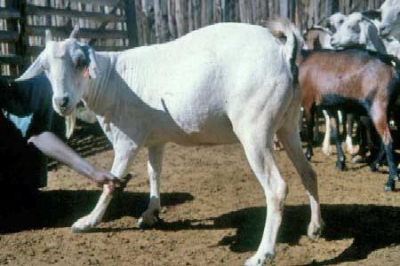 Farmers in Nyando, Western Kenya are shifting from maize farming and ordinary livestock keeping to climate smart agriculture that helps them adapt to the changing climate.
Farmers in Nyando, Western Kenya are shifting from maize farming and ordinary livestock keeping to climate smart agriculture that helps them adapt to the changing climate.
The rough and dusty road leads us to John Obuom's homestead in Kowalla village Nyakach district, Kisumu County. Obuom has taken up rearing of gala goats and Red Masaai sheep which he crossbreeds with indigenous breeds. The gala goats mature faster and fetch him more money to buy food for his family. A mature gala goat costs between Sh 5,000 to Sh 8,000 while a local one costs Sh 2,500 to Sh 3,000.
" I have a small but diverse farm which I plant vegetables, legumes and keep sheep, goats and chicken to boost my family's food supply and nutrition. I used to keep livestock without much planning but now I have more than 10 goats both the small East African indigenous goats and the upgraded grades which are cross breed of gala goats. This is my latest venture and many farmers have benefited through the passing on the gift initiative," said Obuom.
The initiative was established by the CGIAR Research Programme on Climate Change, Agriculture and Food Security (CCAFS) in partnership with World Neighbours where a farmer is given a gala goat to crossbreed with the small East African indigenous one and then they follow up by giving a six month to one year kid to a neighbour for purposes of crossbreeding.
Jared Akuku, World Neighbours, programme associate says the passing on the gift mechanism ensures that everyone in the village benefits and that no one is left out. "Upgrading takes between six months to two years after which the goats are mature and ready for sale. The price of a mature upgraded goat compared to that of an indigenous is incomparable and this helps in improving their livelihoods and also gives them money to buy food," says Akuku. George Nandi, a livestock extension officer in Lower Nyakach division says for a long time there has been a lot of in-breeding between the local breeds and this results to smaller sized goats that do not fetch the farmer good market prices.
"The introduction of the gala goats from Rumuruti division in Laikipia County seeks to produce better breeds that can adapt well to the environment and easy to manage while the farmer earns a good income," says Nandi. For a long time farmers in Nyando have kept livestock for important ceremonies such as weddings, funerals or paying dowry and for some little milk for home consumption. However, this is slowly changing as they are now taking up livestock keeping for income generation through zero grazing of goats and sheep for both meat and milk.
Besides the gala goat, Obuom also keeps the German Alpine goats for milk. He has two goats that provide him with at least six litres of milk daily and locally, one litre of goat milk costs Sh 100. According to research, goat milk compares favourably in nutritive value with cow's milk. It contains smaller fat globules and as a consequence is easier to digest and does not require homogenisation.
It is used extensively in making cheeses. Goat milk casein and goat milk fat are more easily digested than that from cow milk. Goat milk is valued for the elderly, sick, babies, children with allergies, patients with ulcers and even preferred for raising orphan foals and puppie.
In arid and semi arid areas milk from goats and sheep still play a major role especially in child nutrition. Goat milk is higher in Vit A, Niacin, Choline and inositol than cow milk but is lower in Vit B6, B12, C and carotenoids.
"I hope the research team will put more effort to ensure that this climate smart agriculture project will be a success that can be borrowed in other regions to address food insecurity and climate risks that hit farmers in Kenya," Nandi added.
The project is targeting at least 20 farmers per village in the four villages in the area that include Obiju, Kamango, Kobiero and Kamwana. The lack of employment promoted Obuom to engage in smart farming where he has improved his land management through tree cover, water harvesting and planting fruit trees such as pawpaws which he intercrops with tomatoes and local vegetables.
" I started with 500 pawpaw trees now I am planning to make it 1,000 in a quarter acre land. I used to plant maize and it was sometimes disappointing due to the unpredictable rains. I have realised that fruit trees are much profitable than cereals," says Obuom. One pawpaw can cost Sh 50 in the local market and he gets about Sh 6,000 a month.
















Comments powered by CComment